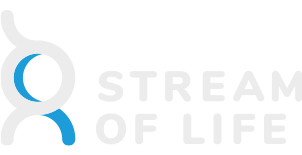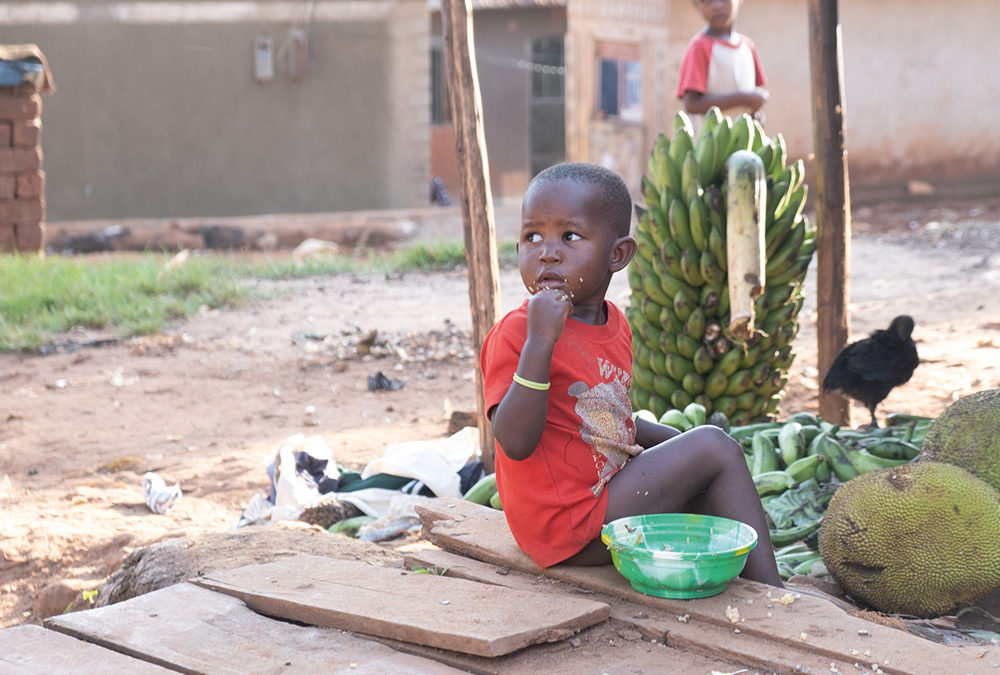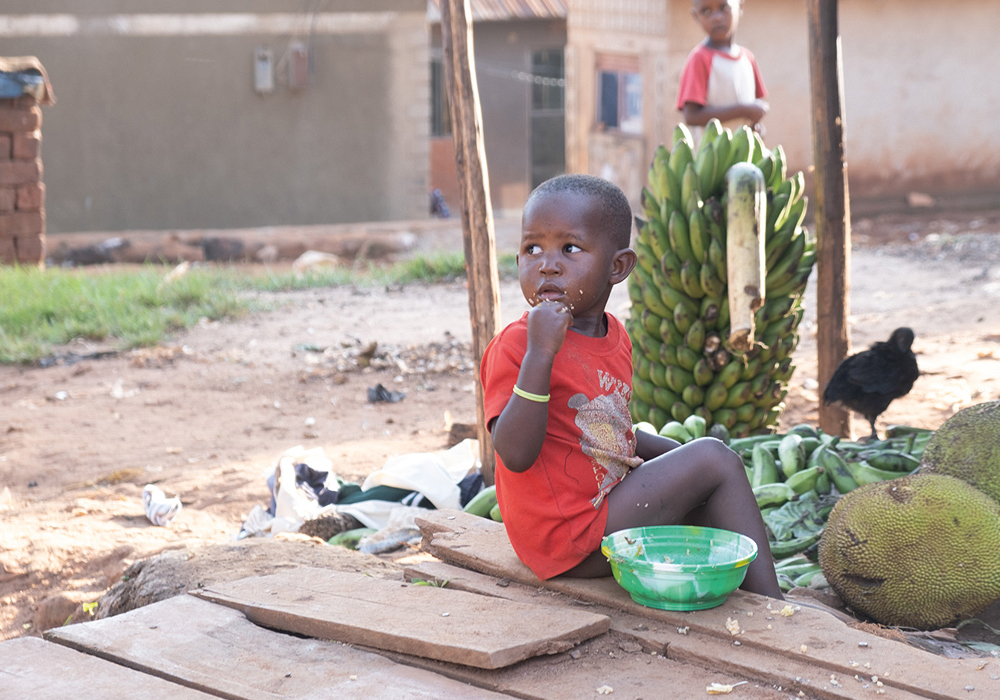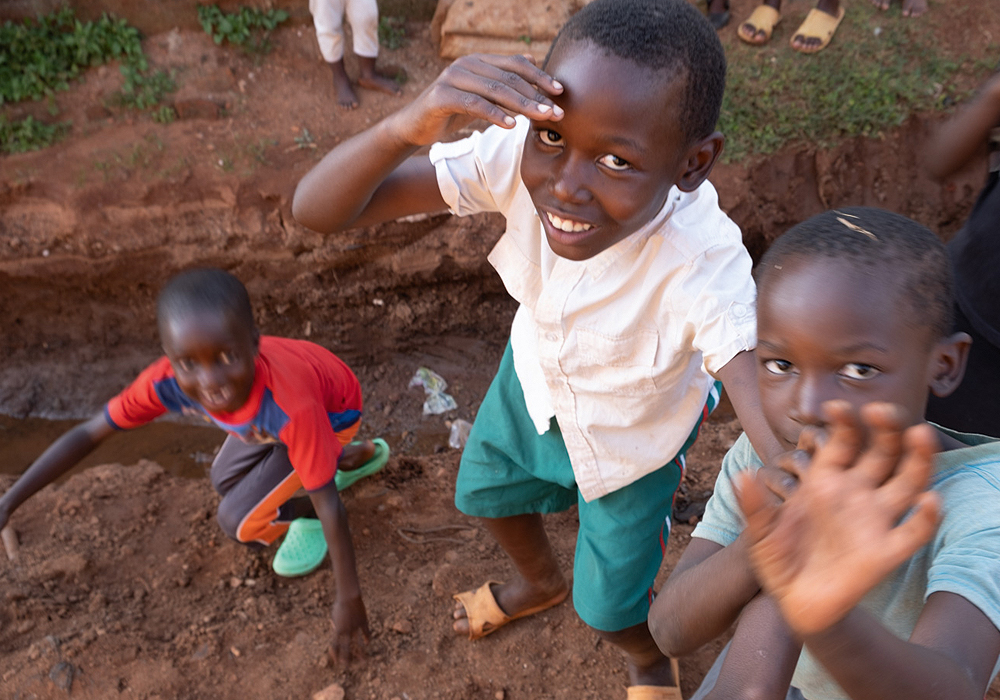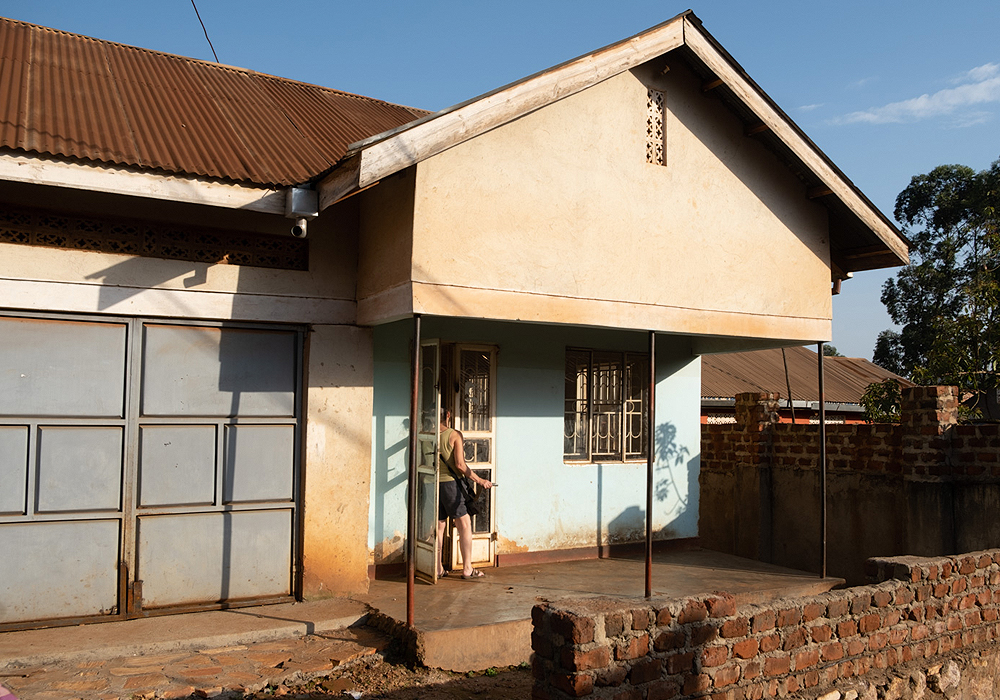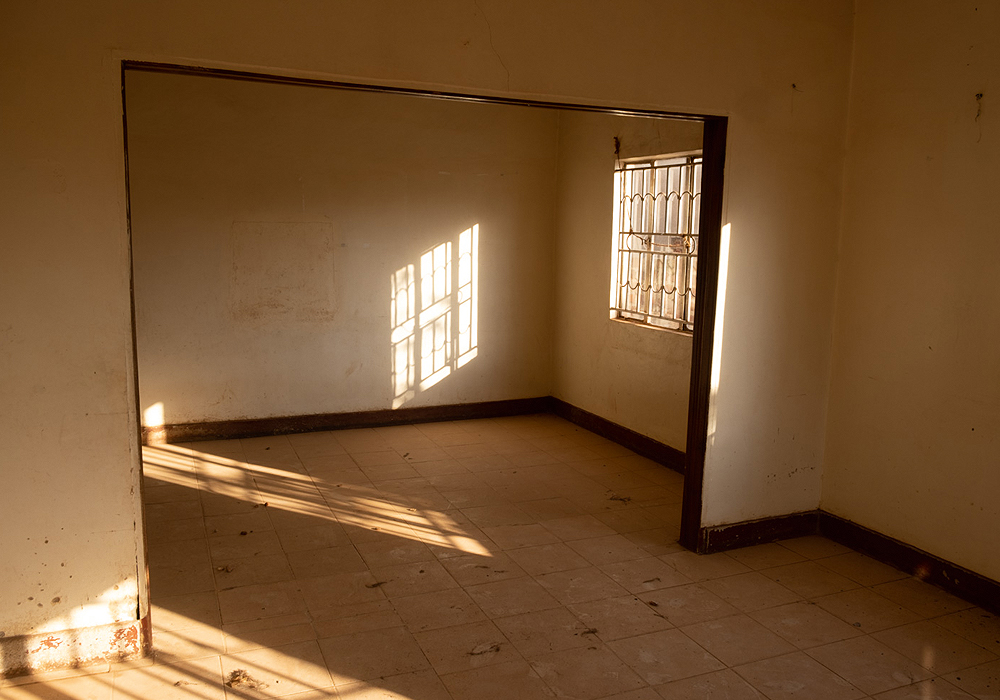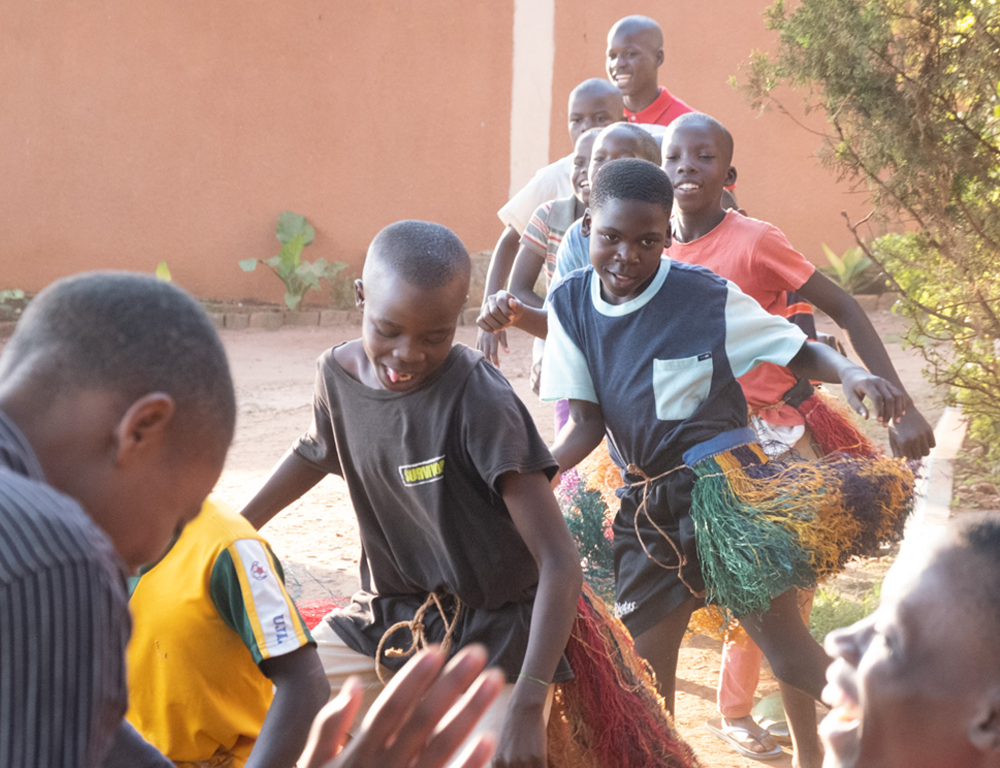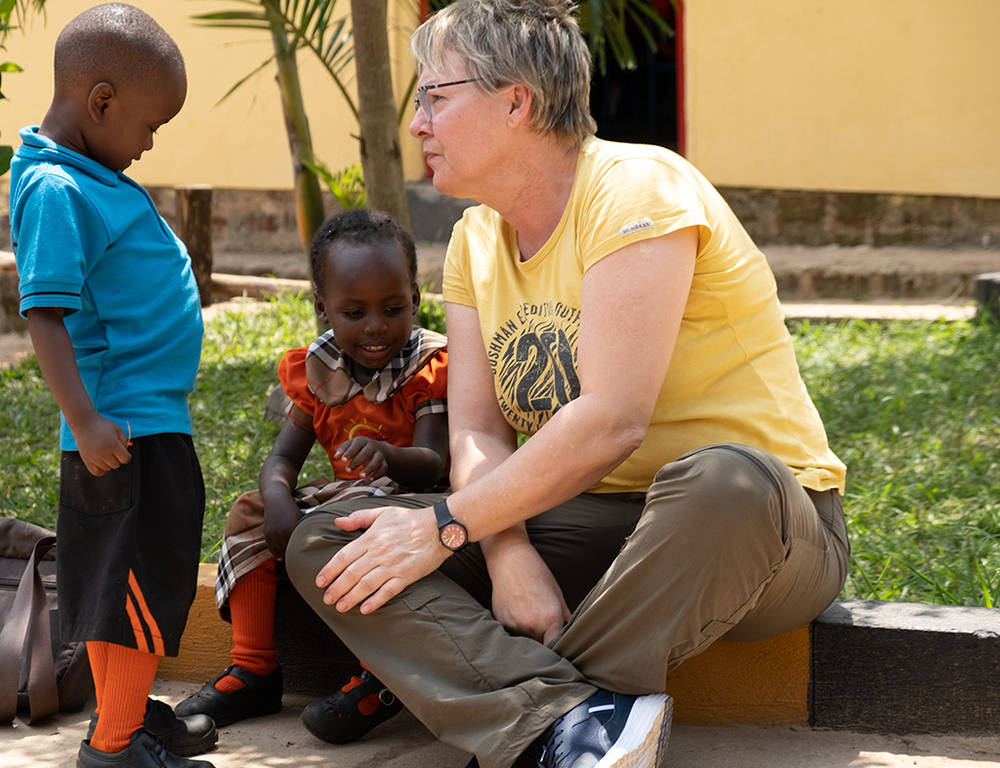A report from Stephanie Langer.
A visit at our friends from Afrinena
Right after our arrival and a short stop in the hotel we drive towards Afrinena. A few months ago, ‘our’ orphans have finally moved into a bigger house. It is not far away from the old one, but it is up on the hill right beside the main road. A little walk through the slum shows that the heavy rainfalls during the last rainy season have clearly worsened the situation. The streets are very rugged and littered with plastic and garbage. Again, a small crowd of children in dirty and punchy clothes accompany us. They spend most of their time outside, which the weather luckily mostly allows. Many children, however, can not go to school because their parents lack the necessary financial means to pay the school fees. The houses there consist of small single-rooms in which the many-headed families live. The old Afrinena-house was not big as well, but now it seems unbelievable that until recently thirty children have lived there.
Afrinena has meanwhile established itself as a social institution within this slum. Many families are supported by receiving food and care by Afrinena for their children while Stream of Life looks for sponsors to manage the necessary school fees. In the new house of the Afrinenas we are welcomed with a lot of dancing, singing and drums. The welcome is full of joy as the new school bus with Afrinena logo and full of tired school children in new uniforms turns into the garden. It is beautiful to see how happy and proud Agnes and Frank Mwesigwa are. The children call them ‘Mummy Agnes’ and ‘Daddy Frank’. The ‘mom of the orphanage’, Eva, and the children are very joyful as well. About forty children currently live in the Afrinena house. It has a slightly larger living/dining room, equipped with furniture from last year. Apart from that, all children have a bed now. The girls live in two rooms in the main building while the boys are separated on the adjoining rooms around the small courtyard behind the house. In the garden in front of the house there is a possibility to grow plants. Besides, there is a small shop near the main road. Although it is in great need of renovation, it could become an opportunity for our female vocational students to take their first steps into self-employment after their training. Besides books and clothes, we bring many games with us, of which there were so far none in the house for the children. Additional to variety and fun, we want to encourage the development of our protégés. It was a funny ball of children on the ground, busy with puzzles, street puzzle stones, a few cars and concentration games. The card games have enjoyed great popularity and Alex has always received us with UNO!-calls. The little stuffed animals have also been looking at us happily from several children’s beds.
While being in Uganda a new problem is looming. The locust plague is beginning to spread to the north of the country. Food retailers take this as an opportunity – whether they are affected or not – to increase their prices. We learn that the prices are subject to frequent fluctuations as a result of such reports and that the supply of basic food thus becomes a major challenge.
Afrinena Children’s Voice:
Ugandan Dances and Songs
Two times we can admire performances of ‘Afrinena Children’s Voice’. Frank Mwesigwa is a music teacher and has set himself the task of giving the children in the slums a common goal. With Afrinena Children’s Voice, he wants to set up a singing and dancing troupe that can perform in public. On an official governmental occasion, he was already able to prove himself. The children have rehearsed various songs and performed traditional Ugandan dances. In our honor, they rehearsed the Austrian anthem. This was a particularly beautiful and touching moment!
Knowledge for Life – The start of school with the Newday-Kids
Joshua Magezi and his sister Esther also welcomed us at the airport. We visit Newday kindergarten to see the latest developments and to hand over the books we have brought with us. Since it is the first days of the new semester, we can celebrate the beginning of school with the children. On this day, all the children are excited and happy, as there is a party where people sing together and get wonderful colorful cakes. We were able to contribute with sponsored Sacher cakes from the Austrian bakery AIDA, which were decorated with red-white-red sugar decorations. They were a perfect contribution for this occasion!
Since the last time, two new classes have been built at Newday for the start of the school project. The first and second grade elementary school (Primary one and two) will be offered for the first time this year. The aim is to make the direct transition from kindergarten to school possible and to encourage the parents to let their children continue to go to school here. The school motto ‘Knowledge for Life’ is actively lived here. The children are not only taught basic skills like reading and writing, but also values such as responsibility for the environment, community and society, punctuality and discipline. In the future, practical knowledge such as vegetable cultivation, cooking and washing will also be integrated into the activities. The goal is to teach the children practical things, which their working parents usually do not have time for at home.
One insight that further strengthens our commitment is that the children are really being encouraged here. This also includes the demand for punctuality, presence and complete equipment. These elementary abilities contribute to the development of a sense of duty of the children and they may master their life practically better through the acquired talents. During the last year, we were able to support the purchase of a plot of land for a new school building, as the kindergarten area is now reaching its limits.
Joshua Magezi has now started the planning for a school building and compiled the required space program so that we could discuss and plan on site together with an architect. The aim is to establish a primary school in Uganda, which will last seven years in accordance with the British system, and to locate the kindergarten, which comprises three classes, on site. The concrete construction phases will now be converted into plans and stages of financing.
Start-ups, recycling and empowerment
Our commitment in Uganda also includes the ecological aspect strongly. For this reason, we attach great importance to raising awareness of waste prevention, recycling, the use of renewable energies and water treatment. Particularly in our school project, it is important to us to address and implement these aspects. Therefore, we are interested in appropriate initiatives and start-ups that are active in Uganda and that we can use or win as cooperation partners for our projects. One example is the plasticpreneurs, an Austrian start-up that operates in Uganda. In a first phase, the start-up developed a simple machine for recycling plastic. We therefore visit a family in their house near Lake Victoria, which has started to produce and sell recycled products from bottle covers and plastic containers. The products range from simple bags and school bags to plates, bowls and cups.
We also visit the ‘Social Innovation Academy’ (SINA). This is where start-ups, which are dedicated to social issues and environmental protection, have settled. We find a collection of circular structured buildings that are based on the traditional designs but were built from plastic bottles filled with soil. Kimuli Fashionabilities are active here, producing a wide variety of bags and clothing from local fabrics and plastic waste such as cement sacks, shelf milk sacks and palm mash. With the support of a Parisian fashion designer they were able to improve their designs. The raincoats made of cement sacks with African lining are especially innovative. Additional to recycling they support disadvantaged people and employ people with physical limitations. In the next pavilion we take straws made from grass from the surrounding area with us – a wonderful alternative to plastic straws!
Another social project is the project ‘Rafiki’ (friend) which was initiated by Joshua Magezi and his sister Esther. They want to support the community of Ggolo, from which their family comes. The focus lies on the support of the women of the community, as women are especially exposed to difficult circumstances at different levels. Particularly young girls have problems with violence in the family. Another issue of the girls is their menstruation, which prevents them from going to school as they suffer from a lack of hygiene material. In addition, they are often married way too young and the family planning is hardly known. Concerning this issue, we can talk in detail with the principal teacher of a local public school.
Together with the local ‘Chairwomen of the Ladies’ and the Chairman, the local ‘District Governor’, we visit the beach where we can talk to fisherwomen. They earn their meager income by selling small fish that are being dried in the sand. However, these fish can only be sold as animal feed at very low prices. If the women do not pay local ‘duties’, they will not be able to sell the goods on the beach. The ‘richer’ people can dry the fish on nets and thus set higher prices because the so-called ‘silver fish’ are a cheap food and a well-liked snack. We see a few children who are not in school since the sale of fish does not generate enough money to pay the school fees. Therefore, they must help their mothers here on the beach to ‘turn’ the fish with a broom to dry them.
Fellow-Travelers:
Sigrid Reymaier, Stephanie Langer
